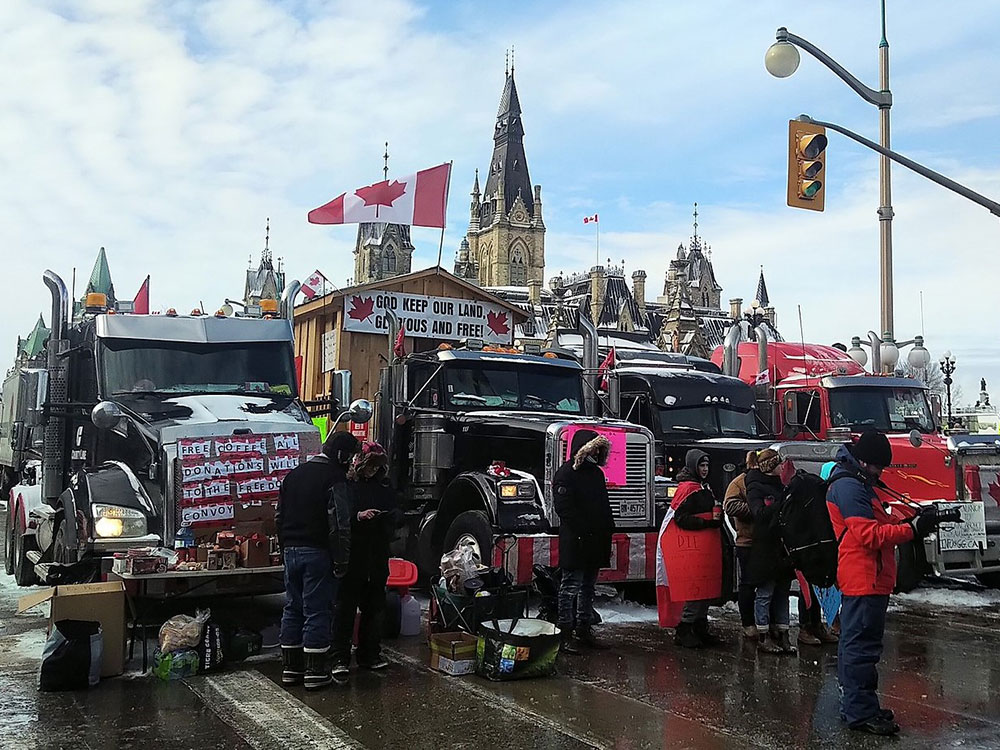Now that the public hearings mandated by law after use of the federal Emergencies Act are underway, we are reminded that Canadian support for the so-called “Freedom Convoy” protesters early this year was an inch wide and an inch deep.
Well, in Alberta, supposedly a hotbed of support for the convoy and certainly home to numerous Conservative politicians who were openly rooting for the insurrectionists behind the occupation of Ottawa and various border blockades, support might have been a few inches wide, but no way was it anywhere near the proverbial mile.
Research commissioned by the Public Order Emergency Commission led by Justice Paul S. Rouleau of the Ontario Court of Appeal shows just how tepid support for the convoy protesters and their goals was here in Alberta.
The paper by University of Alberta political science professor Jared Wesley — "Alberta Separatism and the Freedom Convoy: A New Brand of Western Alienation" — says that public opinion research done in April 2022 for Wesley indicated only 18 per cent of Albertans said they felt positive emotions about the convoy protests.
That compared to 40 per cent who felt anger, anxiety, frustration and other negative emotions. The survey of the views of more than 2,000 Albertans found that 48 per cent of Albertans “strongly opposed this protest and how it was done,” and another 15 per cent were somewhat opposed — so, 63 per cent opposition overall.
“Sizeable majorities of Albertans felt the Freedom Convoy took its protest too far,” the paper also says, and 47 per cent of Albertans answered that the Trudeau government did the right thing by invoking the Emergencies Act.
By contrast, indicators of support for the convoyers’ activities were low — two per cent indicated they donated money, and pro-and con dinner table discussions, by the sound of it, were about 30 per cent opposed to half that in favour, although one imagines some of the pro voices were pretty shouty.
The survey indicated most Albertans opposed the occupation of downtown Ottawa, the blockades at the border and anti-mask protests in Calgary and Edmonton, the paper says.
“All three protests were less popular than the Wet’suwet’en, Black Lives Matter and pro-Ukraine movements,” the survey indicated.
It also showed 47 per cent of respondents thought the convoy protests revealed weaknesses in Canadian democracy, 55 per cent thought they made Canadians’ lives worse, 57 per cent thought the protesters did not deserve sympathy, 58 per cent thought the convoy was a failure, and 59 per cent said the protests made them less proud to be Canadian.
There’s also some interesting if unsurprising stuff about just who Alberta separatists tend to be: white, male, over 55, and having spent all or most of their lives in Alberta.
Wesley’s helpful CBC commentary on Alberta Premier Danielle Smith’s use of the “populist playbook” no doubt contains some insights gleaned researching the support for the convoy blockades.
Meanwhile, on the first day of hearings in Ottawa, a lawyer for the Government of Alberta said of the blockade at the Coutts border crossing that “none of the powers that were created under the federal Emergencies Act were necessary, nor were any of them used.”
This echoed statements made by then-premier Jason Kenney last February, when he claimed “the federal government’s invocation of the Emergencies Act is an unnecessary and disproportionate measure that can violate civil liberties, invades provincial jurisdiction and creates a very dangerous precedent for the future.”
This was odd since the Kenney government sat on its duff for two weeks while the border was blocked at Coutts at a cost of close to $50 million a day to the provincial economy, but the RCMP acting as provincial police didn’t begin to move seriously against the blockaders until Feb. 14, the day the Emergencies Act was invoked.
As I wrote at the time, “on the strength of timing alone, one could make a weak case the Alberta authorities acted first, but the premier’s conduct throughout the siege was that of a man terrified into inaction for fear of offending an extremist group with many friends in his United Conservative Party’s base.”
Moreover, it turned out that on Feb. 5 Kenney’s municipal affairs minister had written to the federal ministers of public safety and emergency preparedness to plead for federal help clearing the mess at Coutts.
“I am requesting federal assistance that includes the provision of equipment and personnel to move approximately 70 semi-tractor trailers and approximately 75 personal and recreational vehicles from the area,” said Ric McIver in his letter to federal Public Safety Minister Marco Mendicino and Emergency Preparedness Minister Bill Blair.
Given that, Alberta’s opposition to the invocation of the act then and now, is to put it kindly, counterintuitive. ![]()
Read more: Rights + Justice, Federal Politics
















Tyee Commenting Guidelines
Comments that violate guidelines risk being deleted, and violations may result in a temporary or permanent user ban. Maintain the spirit of good conversation to stay in the discussion.
*Please note The Tyee is not a forum for spreading misinformation about COVID-19, denying its existence or minimizing its risk to public health.
Do:
Do not: